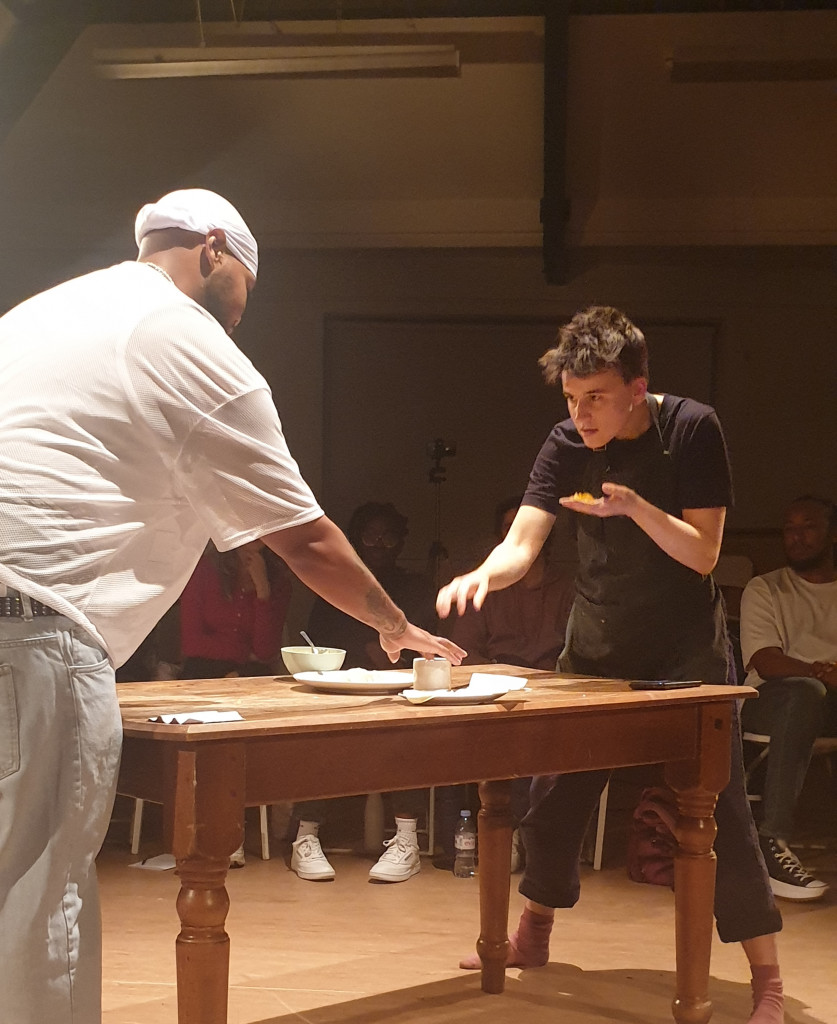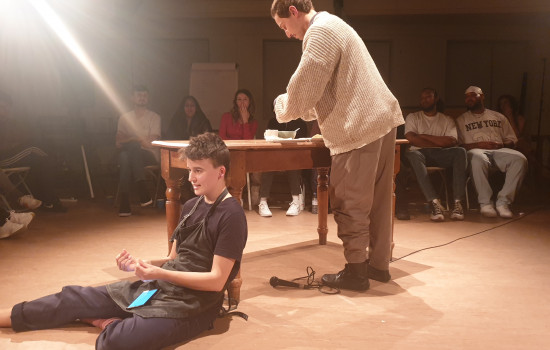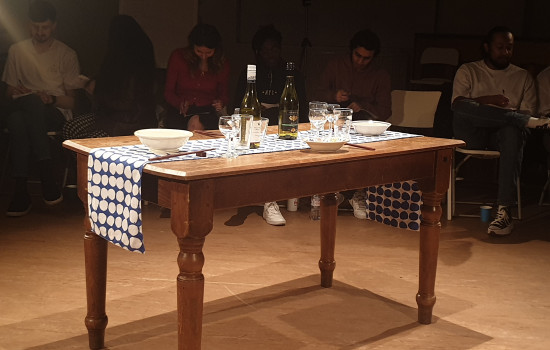The first week of our festival ‘MAKE SPACE!’ is upon us, and the first production in the running order is ‘Crowded Table’, a devised piece about home, cooking, and kitchen spaces.
‘Crowded Table’ is an exploration of kitchen spaces as the center of one person’s life. Friends, family, and food are the backbone of a story about discovering what it means to call somewhere home.’ Despite a very busy rehearsal schedule, we got the chance to sit down with creators Roly (They/Them) and Frewyn (They/Them) to talk all things food, theatre, and while they can’t give too much away at this point, we got an insight into the creative process behind ‘Crowded Table’.

How did you find out about the festival taking place at London Bubble, and what inspired you to join us here?
R: “The Young Vic creators’ program. We had been talking about working together for a while, and then this came up, and we thought it would be perfect to have some space and time, and to make a space where we work as collaborators, outside of just our friendship.”
Speaking of friendship, you’ve both worked as a team to bring this piece of theatre to us. How did you both meet, and what urged you to join forces?
F: “We met a really long time ago, at an audition for a workshop at the National Theatre. It was nice to meet initially in a creative context, but we haven’t done loads of work together creatively. We’ve always really sparked each other’s ideas a lot, and I find them (Roly) a very interesting person to argue creatively with.”
R: “And we do.”
Do you find that you have taken separate roles throughout the process of creating, or has it been a sharing of sorts?
R: “I think we’re definitely co-creating the piece. We do have semi-defined roles considering that Frewyn is performing, and so I’ve stepped into the directing role. Frewyn also wrote the text we’re devising from. But mostly we are co-creating the actual material of the show together.”
In our introductory session, Roly happened to mention that ‘Crowded Table’ is inspired by a piece of writing Frewyn had sitting around. Frewyn, what inspired you to dig this piece out of the archives to turn it into what it is today?
F: “Well, when I was writing it, I’d read bits of it out. So, I knew it kind of worked as something a bit performance-y. I can be quite cagey about my writing, so, when Roly and I were talking about collaborating, Roly asked to read basically everything I thought could be interesting. I think I knew this would probably be the most interesting, so I took a deep breath and sent it to them.
The play takes place across a series of different kitchens. It explores the idea that ‘home’ is built in these very spaces. Do you guys have any stand-out memories from the kitchens you’ve been in?
R: “I mean, come see the play! But I think the kitchen that I grew up cooking in, my childhood home. My brother is now a professional chef. And I’ve always looked up to him, and every time he got a hobby or an interest, I would then also get that hobby or interest, and I would do it ten times more than him. Apart from cooking, he was always so good at it that I was always just happy to ride his coattails. So, I have many happy memories of baking chocolate cakes or making whatever thing he foraged and decided to turn into dinner.”
F: “My grandparents used to live in France, and they had a really tiny house in the middle of nowhere. And the kitchen had yellow walls, which was quite unusual, and it made it always sunny and bright, warm and homely. I did a lot of my first cooking there. It was always such a happy time when we were there.”
Speaking on the topic of home, have you reached any conclusions on what home means to you personally? Or has the process of making this play been an exploration of this for you?
R: “Something we talked about yesterday that rang really truthfully is that home is a doing word, and that home is love and comfort and care, and sometimes it’s the people you love and sometimes it’s yourself. It’s something that you do to create a space.”
F: “It’s something that we’ve talked about, and I don’t think it’s something that we have reached any conclusions about. I just think it changes and evolves so much, and that’s such a big part of it, that it’s so hard to reach a conclusion about.”
Another topic this play touches on is the act of cooking as care. What urged you to explore this?

F: “It’s such a massive part of my life, and the way that I have formed and maintained my friendships, and it’s a big part of the way I was raised. I just find it so interesting because as much as it is a hobby and an expression of love, it also is something that everyone has to do every day, and some people hate it, and some people love it, and I find that universal aspect of it really interesting. Everyone has a relationship to food and to cooking.”
What recipes have you chosen to involve in this play, and why?
R: “So currently, I mean, who knows what will make it to Friday, but currently there’s this motif of making dumplings. And tea. Dumplings and tea. We’ve spoken a lot about the perfect cup of tea, and the fact that that isn’t necessarily the recipe, it’s about the person who makes it for you and what context in which they make it. It’s not making the recipes perfectly that makes them perfect. To quote many cafes across the UK, it’s about it being made with love.”
Also in the introductory meeting, you talked on how this play involves the idea of forming a neutral relationship with food after experiencing a turbulent one. This, of course, is a sensitive subject for many. What procedures have you taken in the creation of this play to ensure this is represented in the way you want it to be?
F: “I think we’ve talked a lot today about how sometimes in theatre you feel a distance from the performance that’s happening. Both as a performer and as an audience member, and I think a lot of the time in theatre that’s presented as a negative thing. As if, if you feel distance from what’s happening on stage, that it can’t be good, or relatable, or impactful, or moving. And I think a lot of safe healthy theatre practice is that when you’re talking about really difficult things, it’s really important that the person on stage isn’t directly experiencing those feelings, and that you’re not manipulating the audience into feeling the feelings of someone who has a mental illness. So we talked about maintaining distance from certain bits of it while communicating them honestly, but without dragging anyone into it. That’s something we’ve tried to maintain.”
You also have discussed that the play has throughlines of exploring queer identity. I believe there was a metaphor of “Making something out of what you’ve got instead of following someone else’s cookbook”. Here’s a metaphorical one. If you had to pick your favorite ingredient from the cookbook of life, what would it be?
R: “Love”
F: “Garlic”
Making food is a ritual. Speaking of rituals, what are some that you like to partake in?
R: “If I cheers someone, with a drink, I have to drink it before I put it down. I know often people will cheers then tap it on the table, then drink it, but I can’t.”
F: “For the last year or so I have done this big dinner for my friends every other week. And it’s sort of become a ritual now. Every other Sunday night, a massive group of us all come over, and we make dinner and whoever wants to can come over and have a chat and a good silly time. That’s been a really nice ritual I’ve made for myself over the last year.”
R: “It’s so messed up how wholesome that is.”

How has this play changed from the original idea to the stage? What have you discovered through getting this play on its feet?
R: “I mean, we didn’t really have an original idea. I think because we’re following a pretty traditional devising model, I never really had a clear picture of it in terms of staging or structure or anything, and it’s been evolving from day 1.”
F: “I think the main change I would say is that reading it, it feels like something you could work into quite a traditional solo show of someone who is going to stand and talk and look at the audience. We’ve gone for a slightly different approach of in the round, and we’re doing some audience participation, and some stuff that might never work outside of this space. Originally, I was like, “we’re going to do a pretty trad solo show”. And it doesn’t feel like that at the moment. I would say that’s the main difference so far.”
Roly, you’ve self-described as a theatre maker by day and a composer by night. What worlds will you be taking us to through sound?
R: “Usually the theatre that I make is so sound-heavy, because that’s the way that I process the world. But this…I mean maybe it’s because we’re so early in the process… we’ve had a lot of music underscoring the work that we’ve been doing but, actually, so far, we’ve not been leaning on it. I think the sound of this piece is human and is communal, so I think choral singing makes a lot of sense to me. I’ve not really felt the need to do lots of sound for it.”
What have been the struggles of displaying this vulnerability during the process?
F: “I think you worry about keeping yourself safe and keeping the audience safe. And the responsibility of putting difficult stuff on stage. I don’t currently feel anxious for people to see a certain part of me, or ashamed or embarrassed, but I feel responsible for keeping the audience safe, and for making sure they know I’m safe. But, I want them to be able to get to places where they believe I’m being vulnerable.”
R: “Something that we’ve made a real choice to do for this play is make sure this is a show about a character. This is not the story of Frewyn’s life. It’s certainly influenced by it and is certainly semi-autobiographical, but we’ve put things in the show that are totally made up.”
F: “And so for my own comfort at any given point, I can easily say “oh this bit isn’t real” even if it was real. Because bits of it aren’t. I don’t have to feel as if I’ve bared my soul on stage”
R: “When I’m working with actors on more traditional pieces that have clearly defined characters, I do try to make the effort that actors don’t get lost in the role. It is so important to bring parts of yourself to the performance, but not to the extent that it becomes putting your insides on the stage. That’s not what theatre is, I don’t think.”
On a lighter note, I believe there is the potential for an audience taste test if they come to watch! Describe the food you’re preparing for them in one word.
Both: “Tingly”.
We want to thank the fabulous Freywn and Roly for sitting down with us during such a busy day.
Come and join us at 7:30pm, Friday 25 October, at London Bubble for our showing of ‘Crowded Table’. It’s guaranteed to be a fun, foody time.
– Gina Hamer, writer in residence on placement with London Bubble from the Royal Central School of Speech and Drama
